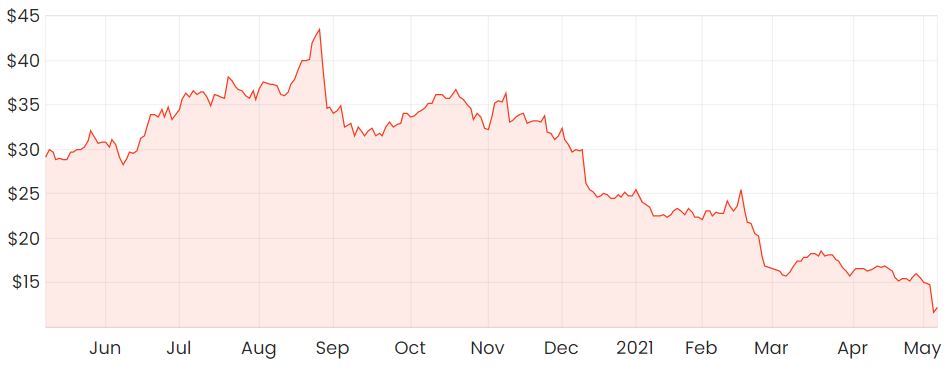Appen Ltd (ASX: APX) shares have slumped another 5% today after making a brief recovery last Friday.
The short-term volatility in Appen’s valuation has been the result of an investor presentation at the Macquarie Australia Conference last week which sent shares down by over 20% on the day.
The long-term outlook paints an even bleaker picture.
APX share price

It’s hard to believe that Appen’s shares reached a high of $43.6 nine months ago, meaning you can now buy the exact same company at a 73% discount, albeit with a fairly cloudy outlook on what the future may hold for the ex-market darling.
The outlook may seem unclear at this point, but in general, Appen still has some features of a quality investment due to some of the macro trends working in its favour. The massive drawdown is that its valuation is starting to reach a point for me where it almost seems to be too good to pass up.
Macquarie Conference recap
Last week’s presentation didn’t reveal too much new information, but it did seem to confirm some of the challenges that the company’s up against. To some readers, they might’ve inferred that some of these issues are more structural rather than transitory in nature.
The two main points that could’ve possibly conveyed this message to some are as follows:
“Our customers are developing new AI products in response to COVID’s impact on online advertising last year and regulatory pressures such as anti-trust and data privacy. As stated before, machine learning is an iterative process, and our customers are switching resources between development projects as they pursue new break-out products. This in turn has impacted a handful of our larger programs.”
While the first sentence may seem alarming and imply that Appen’s technology is being replaced, one way I could interpret this is that many of Appen’s customers are switching due to stages of the project lifecycle.
Management seem fairly confident that artificial intelligence (AI) development techniques will continue to rely on high-quality labelled training data and therefore, Appen’s place in the industry won’t be completely undermined by insourced internal resources.
If this turns out to be true and provided that new projects are commenced, it would seem that Appen may in fact be exposed to the cyclical nature of other company’s own expenditure, which may result in some fairly lumpy revenues along the way.
“Our competitors outside of relevance are maturing. This is unsurprising. Their presence and funding demonstrate that ours is an attractive market. We maintain our leadership position and our customers rely on us for quality, scale, security and reliability but it means that we have to maintain our flow of new product features and fight harder to stay ahead.”
This sentence is slightly more concerning than the first to me. Competition risk is high and there doesn’t seem to be any obvious competitive advantage that could really set Appen apart from its competitors.
Appen has a compelling product offering that I believe is durable, i.e., It seems likely that data labelling AI processes will be around in five years’ time. However, I don’t think that durability is a competitive advantage in itself, as it’s still exposed to the threat of competition despite operating in an attractive macro thematic.
Valuation
Presumably due to being in the AI and machine learning space, Appen’s typically been lumped in with other ASX tech companies and unsurprisingly, its shares have traded on a fairly lofty multiple despite having few characteristics of a scalable tech company.
It all comes down to Appen’s business model, which relies on its contractor base of over 1 million people worldwide that act as the “picks and shovels” of the industry. It’s human labour that performs labelling services on things like images, text, speech and video, which improves a machine learning algorithm.
At the moment, Appen is more comparable to a glorified labour-hire business rather than a technology company that can display large amounts of operating leverage as the business grows larger. But there is a reason why Appen’s valuation could demand such a high multiple.
Ideally, after humans were to label the first 10,000 of 1 million images, as an example, its own machine learning process would be able to handle the rest, which would drastically reduce project times and associated labour costs.
This is the blue-sky case which simply hasn’t happened to the point where margins are beginning to expand. As such, I don’t think Appen’s shares are worthy of such a demanding multiple. Figuring out what price is fair is the complicated part.
If you had no prior knowledge that Appen’s shares used to trade at $43, would you still think that shares at $11.5 are in bargain territory?
Summary
Despite a fairly average business model, I still think the long-term outlook for Appen is positive, but I’m still not going to be a buyer of Appen’s shares just yet.
If buying on valuation grounds, I’d need to have a better sense of current valuation and would likely use a discounted cash flow (DCF) model to get an estimation of intrinsic value.
Future company updates will also be closely monitored to see how project numbers are growing and how its expansion into new markets is progressing.
In its investor presentation last week, Appen noted that its China business is growing at 60% quarter on quarter in 2020 and it won 136 new customers worldwide as well.
For some more ideas on ASX growth shares, I’d recommend signing up for a free Rask account to gain access to our stock reports.










